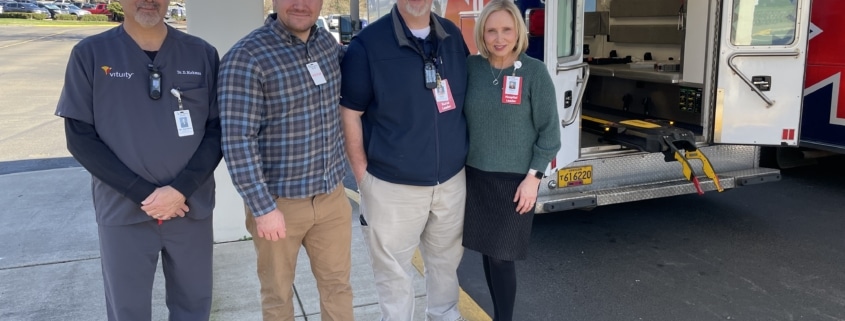Rep. Skarlatos Gets Crash Course on Health Care Challenges
After just one hour meeting with Dr. Sarah Agsten at Family Tree Medical Clinic in Roseburg, Oregon Rep. Alek Skarlatos (R-Winston) said he learned more about the delivery of health care than he had since joining the Legislature earlier this year.
Their meeting on Feb. 28, organized by the Douglas County Independent Physicians Association (DCIPA), was an opportunity to discuss issues facing coordinated care organizations and ways lawmakers can improve the system for both doctors and patients. DCIPA is one of the partners behind Umpqua Health Alliance, a local CCO serving 38,000 members in Douglas County.
Skarlatos heard from Agsten about the challenges she faces daily at her practice, including the declining value of Medicare reimbursement for physician services and how lower medical pay affects recruiting doctors in rural areas like Douglas County.
After witnessing a patient intake (the patient consented in advance), Skarlatos reflected on the increasingly burdensome documentation of health metrics required by Medicare and Medicaid.
“It’s just a lot of overhead for an office visit,” Skarlatos said.
Agsten also emphasized the importance of protecting the Prioritized List, which ranks certain conditions and treatments based on evidence to determine what gets covered under the Oregon Health Plan.
“It works,” Agsten said of the Prioritized List.
Following his visit at Family Tree Medical Clinic, Skarlatos toured the Emergency Department at CHI Mercy Health, also in the Umpqua Health network. There, he spoke with Todd Luther, the hospital’s director of emergency services, about tweaking legislation that could help reduce wait times and provide more efficient care for patients.

That would involve modifying HB 2697, passed in 2023, which requires staffing committees at hospitals to develop written hospital-wide staffing plans. Currently, the law mandates that a maximum nurse staffing ratio for emergency departments be set at 1-to-4, regardless of the acuity of patients being cared for.
Luther said it would be beneficial if emergency departments could segregate lower acuity patients and raise the maximum nurse staffing ratio to 1-to-6 when caring for “fast-track” patients with less serious conditions.
“Making these changes will help ensure we can continue to care for the patients in our community, reduce wait times, and improve overall efficiency in our Emergency Departments while ensuring nurses still have safe patient assignments,” Luther said.
DCIPA will provide updates on this proposed change. We appreciate Skarlatos visiting with our partners and showing commitment to improving health care in our rural Oregon communities.


